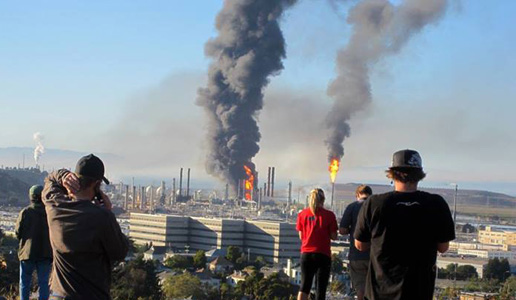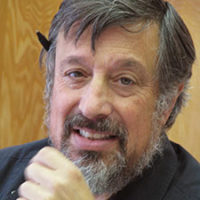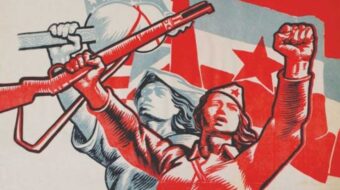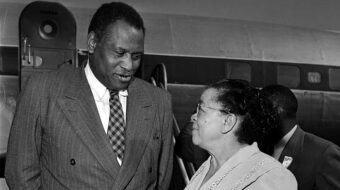
RICHMOND, Calif. – The large protest August 3 at Richmond’s Chevron refinery was the culmination of a summer cross-country trek for 350.org leader Bill McKibben and his wife Sue, aimed to boost local struggles and the involvement of local communities in the worldwide movement for climate justice.
The protest began with a march that grew to 3,000 once it reached the gates of the Chevron refinery, and 209 were subsequently arrested in a sit-down act of non-violent civil disobedience. It marked the first anniversary of a refinery explosion and fire that sent 15,000 residents to area hospitals with respiratory and other problems on August 6, 2012.
The potential for people-to-people solidarity was in dramatic display at the rally when Richmond Mayor Gayle McLaughlin read a full-page ad appearing that morning in the local newspaper:
“In the fight against Chevron, the people of Ecuador and the people of Richmond can deploy the most devastating weapon ever invented. The truth.”
And what is the truth?
For two decades Chevron has been fighting a suit filed on behalf of 30,000 Ecuadorian Amazon rainforest residents.
The suit charges the company with deliberately dumping 18 billion gallons of toxic wastewater into estuaries and rivers, spilling 17 million gallons of crude oil, and leaving hazardous waste in hundreds of open pits dug out of the forest floor.
(Chevron did nothing to mitigate the effects of this ecological nightmare after acquiring Texaco, the original perpetrator of the disaster, in 2001).
Chevron’s attitude has been appropriately summarized by one of its own company officials who in 2009 said, “We’re going to fight this until hell freezes over. And then we’ll fight it out on the ice.”
Meanwhile, the day before the Richmond protest, the City Council, the mayor and their attorneys filed litigation against Chevron in connection with the August 6, 2012, fire after negotiations between the city and Chevron fell through.
The lawsuit alleges the explosion and blaze at the Richmond refinery resulted from “years of neglect, lax oversight and corporate indifference to necessary safety inspection and repairs.”
The civil lawsuit seeks financial compensation for economic damage to the city, including the costs of emergency response, fire-fighting, environmental cleanup, alleviating harm to public health, and loss of value in city property.
Two days after the protest, in a separate legal case, Chevron agreed to pay $2 million in fines and restitution after pleading no contest to six misdemeanor criminal charges stemming from last year’s fire at its Richmond refinery.
The penalties resulted from joint charges filed by California state Attorney General Kamala Harris and Contra Costa County District Attorney Mark Peterson.
Chevron attorneys accepted the terms, including 3-1/2 years of probation, $1.28 million in fines, and more than $720,000 in restitution payments to three different agencies.
However, Andres Soto, an activist with Communities for a Better Environment, told the Contra Costa Times, “What is curious to me is how the city of Richmond seems to be cut out of any restitution.”
Frank Pitre, partner in the law firm that is suing Chevron on behalf of the city, said, “This is the same company that just last Friday issued a press statement calling Richmond’s (civil) lawsuit merit-less, yet at the same time was negotiating a settlement to resolve criminal charges against them.”
He added, “The hypocrisy is astounding.”
In an email blast to supporters of 350.org within days of the Richmond protest, McKibben related his and his wife’s experience in their cross-country tour that included marches, rallies and civil disobedience in pursuit of climate justice and related local issues.
McKibben said, “We saw people – the beautiful face of a movement that’s growing, learning, coming together … It’s incredibly diverse … But no matter our differences, everywhere we share an adversary: a fossil fuel industry so focused on greed that they’re willing to rip apart the planet and its communities.
“If this was a movement of a few big organizations or a few leaders, then the industry wouldn‘t need to worry so much. But instead there are thousands of local leaders, and hundreds of local organizations – and they‘re linked together in new, exciting ways that spell trouble for the fossil fuel barons, and hope for a troubled earth.”
Photo: Chevron refinery fire in Richmond, Calif., August 2012. Communities for a Better Environment Facebook page.

MOST POPULAR TODAY


Zionist organizations leading campaign to stop ceasefire resolutions in D.C. area

High Court essentially bans demonstrations, freedom of assembly in Deep South

Communist Karol Cariola elected president of Chile’s legislature

Afghanistan’s socialist years: The promising future killed off by U.S. imperialism






Comments